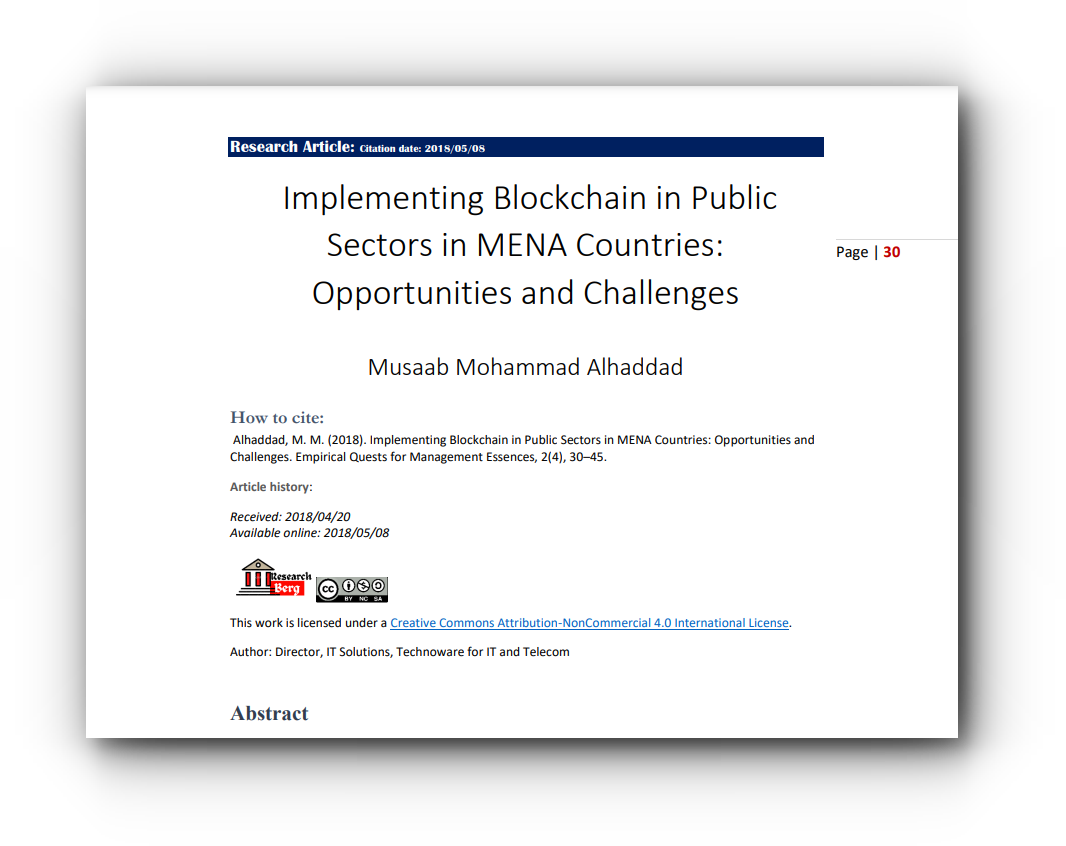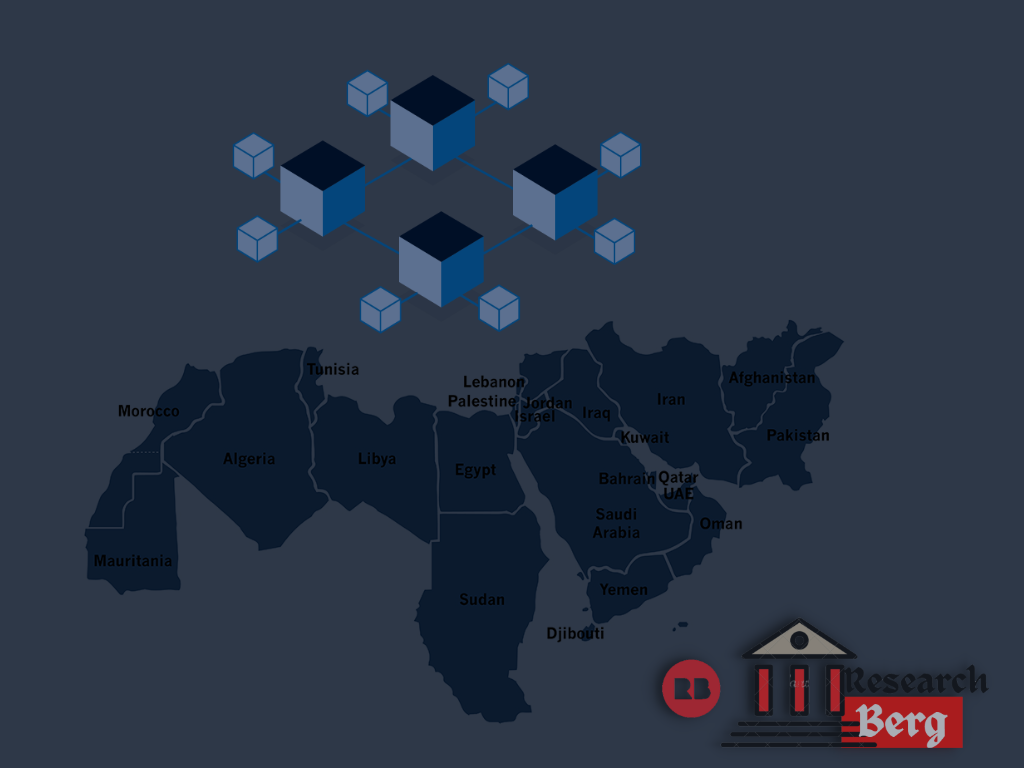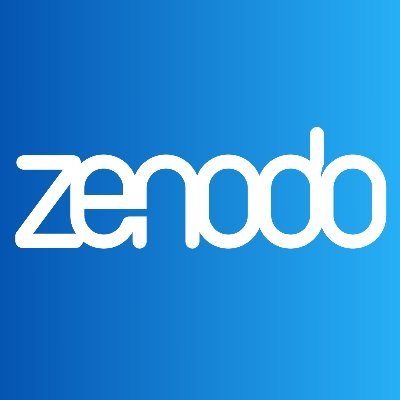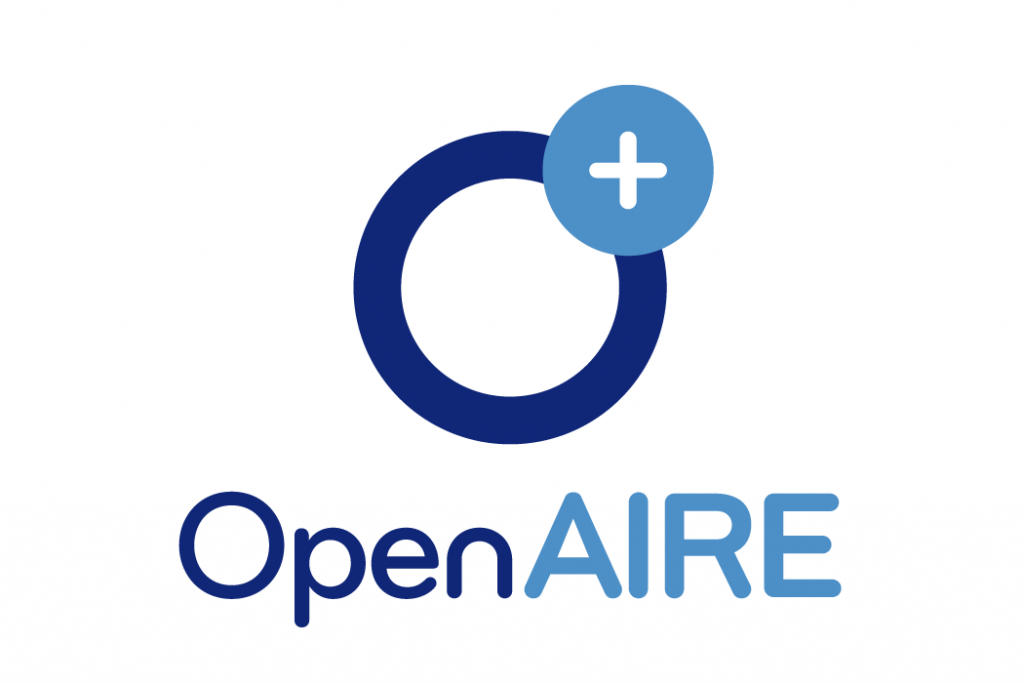Implementing Blockchain in Public Sectors in MENA Countries: Opportunities and Challenges
Keywords:
Blockchain, MENA, Public sector, record managementAbstract
Governments all around the world are expanding their study and use of Blockchain technology Blockchains have the potential to improve many aspects of the public sector. This research discusses opportunities and challenges in using blockchain in the public sectors of MENA countries. Their public sectors may use it to safeguard sensitive documents and streamline interactions with residents and solve record-keeping challenges and improve the capabilities of the present public systems. Instability and corruption have weakened public and market trust in MENA countries. Moreover, public data in the region is housed in a disjointed bureau and division. The process of acquiring and transferring assets, whether physical goods or financial instruments, often entails multiple transactions and a long paper trail. We argued that as blockchain needs a minimal digital trace, integrity, and immutability, it is particularly fit for the public sectors in the MENA region. A blockchain would keep detailed records of the exchanged assets as well as every step of the transaction. All important information about each person or corporation would be maintained in a separate ledger inside an encrypted blockchain. However, the lack of expertise and experience among the government employees, and the lack of real use cases around the world are the main barriers to implementing blockchain technology in the public sector of MENA countries.

References
Ahmad, A. et al. (2018) “Towards Blockchain-Driven, Secure and Transparent Audit Logs,” in Proceedings of the 15th EAI International Conference on Mobile and Ubiquitous Systems: Computing, Networking and Services. New York, NY, USA: Association for Computing Machinery (MobiQuitous ’18), pp. 443–448.
Alhaddad, M. M. (2017) “The Impacts of EdTech Collaboration, IoT-Connected Classroom and Intelligent Grading System on Educational Performance,” Advances in Contemporary Science and Technology, 2(1), pp. 44–67.
Apte, S. and Petrovsky, N. (2016) “Will blockchain technology revolutionize excipient supply chain management?,” Journal of Excipients and Food Chemicals. International Pharmaceutical Excipients Council of the Americas, 7(3), p. 910.
Assaad, R. and Roudi-Fahimi, F. (2007) Youth in the Middle East and North Africa: Demographic opportunity or challenge? Population Reference Bureau Washington, DC.
Barata, K., Cain, P. and Thurston, A. (2000) “Building a case for evidence: research at the International Records Management Trust, Rights and Records Institute,” Records Management Journal. MCB UP Ltd, 10(1), pp. 9–22.
Basu, S. and Waymire, G. B. (2006) “Recordkeeping and human evolution,” Accounting horizons. meridian.allenpress.com. Available at: https://meridian.allenpress.com/accounting-horizons/article-abstract/20/3/201/52395.
Batubara, F. R., Ubacht, J. and Janssen, M. (2018) “Challenges of blockchain technology adoption for e-government: a systematic literature review,” in Proceedings of the 19th Annual International Conference on Digital Government Research: Governance in the Data Age. New York, NY, USA: Association for Computing Machinery (dg.o ’18, 76), pp. 1–9.
Ben Naceur, S., Cherif, M. and Kandil, M. (2014) “What drives the development of the MENA financial sector?,” Borsa Istanbul Review. Elsevier, 14(4), pp. 212–223.
Brixi, H., Lust, E. and Woolcock, M. (2015) Trust, voice, and incentives: Learning from local success stories in service delivery in the Middle East and North Africa. World Bank Publications.
Chanley, V. A., Rudolph, T. J. and Rahn, W. M. (2000) “The origins and consequences of public trust in government: a time series analysis,” Public opinion quarterly. academic.oup.com, 64(3), pp. 239–256.
Cheng, S. et al. (2017) “Using blockchain to improve data management in the public sector.” McKinsey. Available at: http://dln.jaipuria.ac.in:8080/jspui/bitstream/123456789/2925/1/Using-blockchain-to-improve-data-management-in-the-public-sector.pdf.
Coetzee, J. (2014) “The impact of corruption on development,” Journal of Public Administration. journals.co.za. Available at: https://journals.co.za/doi/abs/10.10520/EJC164767.
Creane, S. et al. (2004) “Financial Sector Development in the Middle East and North Africa.” Available at: https://papers.ssrn.com/abstract=879026
Dai, J., Wang, Y. and Vasarhelyi, M. A. (2017) “Blockchain: An Emerging Solution for Fraud Prevention,” The CPA Journal; New York. search.proquest.com, pp. 12–14. Available at: https://search.proquest.com/openview/37d6f16662e21feea20dacfd6664287a/1?pq-origsite=gscholar&cbl=41798.
Deighton-Smith, R., Erbacci, A. and Kauffmann, C. (2016) “Promoting inclusive growth through better regulation: The role of regulatory impact assessment.” OECD. Available at: https://www.oecd-ilibrary.org/governance/promoting-inclusive-growth-through-better-regulation_5jm3tqwqp1vj-en.
Emara, N. and Jhonsa, E. (2014) “Governance and Economic Growth: Interpretations for MENA Countries,” Emara, Noha and Jhonsa, Eric (2014). Available at: https://papers.ssrn.com/abstract=3810934
Emmadi, N. and Narumanchi, H. (2017) “Reinforcing Immutability of Permissioned Blockchains with Keyless Signatures’ Infrastructure,” in Proceedings of the 18th International Conference on Distributed Computing and Networking. New York, NY, USA: Association for Computing Machinery (ICDCN ’17, 46), pp. 1–6.
Faizan, D. and Ishrat, S. (2018) “Impeccable Renaissance Approach: An e-Village Initiative,” in Applications of Computing and Communication Technologies. Springer Singapore, pp. 335–346.
Fawzy, S. (2002) Globalization and Firm Competitiveness in the Middle East and North Africa Region. World Bank Publications.
Fräss-Ehrfeld, C. (2009) Renewable energy sources: a chance to combat climate change. Kluwer Law International BV.
Fridgen, G. et al. (2018) “Challenges and opportunities of blockchain-based platformization of digital identities in the public sector,” in Workshop on Platformization in the Public Sector, 26th European Conference on Information Systems (ECIS). orbilu.uni.lu. Available at: https://orbilu.uni.lu/handle/10993/44519.
Galeeva, G. M., Ivanov, M. E. and Vafin, A. Y. (2016) “The innovative development of the industrial economy of Russia,” core.ac.uk. Available at: https://core.ac.uk/download/pdf/197473691.pdf.
Gao, Z. et al. (2018) “Blockchain-based Identity Management with Mobile Device,” in Proceedings of the 1st Workshop on Cryptocurrencies and Blockchains for Distributed Systems. New York, NY, USA: Association for Computing Machinery (CryBlock’18), pp. 66–70.
Gilliland, A. J. (2014) “Moving past: probing the agency and affect of recordkeeping in individual and community lives in post-conflict Croatia,” Archival Science. Springer, 14(3), pp. 249–274.
Gollins, T. et al. (2014) “On using information retrieval for the selection and sensitivity review of digital public records,” in PIR@ SIGIR. openreview.net. Available at: https://openreview.net/pdf?id=r1ZCfHZO-S.
Hassan, G. F., Najdi, Y. and Reza, E. A. (2013) “Do governance factors matter for happiness in the MENA region?,” International journal of social economics. Emerald Group Publishing Limited, 40(12), pp. 1028–1040.
Hattab, H. (2011) “Towards understanding women entrepreneurship in MENA countries,” in ICSB World Conference Proceedings. International Council for Small Business (ICSB), p. 1.
Hou, H. (2017) “The Application of Blockchain Technology in E-Government in China,” in 2017 26th International Conference on Computer Communication and Networks (ICCCN). ieeexplore.ieee.org, pp. 1–4.
Kaufmann, D., Kraay, A. and Mastruzzi, M. (2011) “The Worldwide Governance Indicators: Methodology and Analytical Issues1,” Hague Journal on the Rule of Law. Cambridge University Press, 3(2), pp. 220–246.
Kshetri, N. and Voas, J. (2018) “Blockchain in Developing Countries,” IT professional. ieeexplore.ieee.org, 20(2), pp. 11–14.
Kube, N. (2018) “Daniel Drescher: Blockchain basics: a non-technical introduction in 25 steps,” Financial Markets and Portfolio Management. Springer, 32(3), pp. 329–331.
Kuo, T.-T., Kim, H.-E. and Ohno-Machado, L. (2017) “Blockchain distributed ledger technologies for biomedical and health care applications,” Journal of the American Medical Informatics Association: JAMIA. academic.oup.com, 24(6), pp. 1211–1220.
Lyons, T. (2018) “EU Blockchain Observatory and Forum,” in Workshop Report. Government Services and Digital Identity. Brussels, July 5. eublockchainforum.eu. Available at: https://www.eublockchainforum.eu/sites/default/files/reports/workshop_3_report_-_government_services2fdigital_id.pdf.
McKemmish, S. et al. (2005) “Archives: recordkeeping in society.” books.google.com.
McKemmish, S. (2017) “Recordkeeping in the Continuum,” Archival Multiverse. library.oapen.org. Available at: https://library.oapen.org/bitstream/handle/20.500.12657/31429/628143.pdf?sequence=1#page=131.
Memon, M. et al. (2018) “Blockchain Beyond Bitcoin: Block Maturity Level Consensus Protocol,” in 2018 IEEE 5th International Conference on Engineering Technologies and Applied Sciences (ICETAS). ieeexplore.ieee.org, pp. 1–5.
Naudé, W. (2017) “Entrepreneurship, Education and the Fourth Industrial Revolution in Africa.” doi: 10.2139/ssrn.2998964.
Neaime, S. (2005) “Financial Market Integration and Macroeconomic Volatility in the MENA Region: An Empirical Investigation,” Review of Middle East Economics and Finance. De Gruyter, 3(3), pp. 59–83.
Newton, K. (2001) “Trust, Social Capital, Civil Society, and Democracy,” International Political Science Review. SAGE Publications Ltd, 22(2), pp. 201–214.
Ølnes, S., Ubacht, J. and Janssen, M. (2017) “Blockchain in government: Benefits and implications of distributed ledger technology for information sharing,” Government information quarterly. Elsevier, 34(3), pp. 355–364.
Ramadhani, A. M., Choi, H.-R. and Kim, N.-R. (2018) “Blockchain Implementation in Government :A Review,” 인터넷전자상거래연구. dbpia.co.kr, 18(2), pp. 35–48.
Rivera, R. et al. (2017) “How digital identity on blockchain can contribute in a smart city environment,” in 2017 International Smart Cities Conference (ISC2). ieeexplore.ieee.org, pp. 1–4.
Saidi, N., Yared, H. and Others (2003) “e-Government: Technology for good Governance, Development and Democracy in the MENA Countries,” in. Economic Research Forum. Available at: https://www.academia.edu/download/41382438/E-government-technology-for-good-governance-development-and-democracy-in-MENA-countries-MAY-2005.pdf.
Salahuddin, M. and Alam, K. (2016) “Information and Communication Technology, electricity consumption and economic growth in OECD countries: A panel data analysis,” International Journal of Electrical Power & Energy Systems. Elsevier, 76, pp. 185–193.
Sayan, S. (2009) Economic Performance in the Middle East and North Africa: Institutions, Corruption and Reform. Routledge.
Seznec, J.-F. and Kirk, M. (2010) Industrialization in the Gulf: A socioeconomic revolution. Routledge.
Shukla, S. K. (2016) “Editorial: Distributed Public Ledgers and Block Chains—What Good Are They for Embedded Systems?,” ACM Transactions on Embedded Computing Systems. New York, NY, USA: Association for Computing Machinery (1), 16(1), pp. 1–2.
Vafin, A. (2017a) “Negotiation with Dominant Supplier: Power Determination, Partnership, and Joint Buying,” International Journal of Contemporary Financial Issues. hcommons.org. Available at: https://hcommons.org/deposits/item/hc:44887/.
Vafin, A. (2017b) “The Impacts of Performance Records, Influence Potential and Passion on Leadership Training Productivity,” Journal of Modern Issues in Business Research. hcommons.org. Available at: https://hcommons.org/deposits/item/hc:44885/.
Vafin, Aidar (2018) “Should Firms Lower Product Price in Recession? A Review on Pricing Challenges for Firms in Economic Downturn,” ResearchBerg Review of Science and Technology . researchberg.com, 2(3), pp. 1–24.
Vafin, A. (2018) “Volume Discount Sensitivity Analysis for Optimal Pricing Strategies in B2B Firms,” Empirical Quests for Management Essences. researchberg.com. Available at: https://researchberg.com/index.php/eqme/article/view/33.
Vafin, A. M. et al. (2012) “Improvement of regional economic policy in the municipalities of the Republic of Tatarstan,” Bulletin of the Kazan State. Available at: https://scholar.google.ca/scholar?cluster=904444820856570469&hl=en&as_sdt=0,5&sciodt=0,5.
Vafin, A. M., Morozov, A. V. and Galeeva, G. M. (2012) “Conditions and mechanisms of investment support innovative regional economic development,” Bulletin of Kazan State Technological University. Available at: https://scholar.google.ca/scholar?cluster=13118339938906835903&hl=en&as_sdt=0,5&sciodt=0,5.
Vafin, A. M., Morozov, A. V. and Galeeva, G. М. (2012) “Conditions and mechanisms of investment support of innovative development of regional economy,” Bulletin of Kazan Technological University. Available at: https://scholar.google.ca/scholar?cluster=10816658587039665617&hl=en&as_sdt=0,5&sciodt=0,5.
Wang, M. et al. (2018) “Lightweight and Manageable Digital Evidence Preservation System on Bitcoin,” Journal of computer science and technology. Springer, 33(3), pp. 568–586.
Werbach, K. (2018) “Trust, but verify: Why the blockchain needs the law,” Berkeley technology law journal / Boalt Hall School of Law, University of California, Berkeley. JSTOR, 33(2), pp. 487–550.
Williams, M. (2016) “Youth, peace, and security: A new agenda for the Middle East and North Africa,” Journal of international affairs. JSTOR, 69(2), pp. 103–114.
Yli-Huumo, J. et al. (2016) “Where Is Current Research on Blockchain Technology?-A Systematic Review,” PloS one. journals.plos.org, 11(10), p. e0163477.

Downloads
Published
How to Cite
Issue
Section
License
Copyright (c) 2018 Author

This work is licensed under a Creative Commons Attribution-NonCommercial-NoDerivatives 4.0 International License.
Creative Commons licenses are used to publish Open Access articles, which provide the legal basis for users to access, distribute, and reuse the content. EQME allows authors to apply one of the following Creative Commons licenses to their work, each of which affords readers distinct rights in terms of commercial use and the capacity to create derivative versions:
CC-BY (Creative Commons Attribution License)
CC-BY-NC-ND (Creative Commons Non-Commercial No Derivatives License)
CC-BY-NC-SA (Creative Commons Non-Commercial Share-a-like)
In each situation, the creator must be given credit, and if derivative versions of the work are created, the alterations must be noted.






